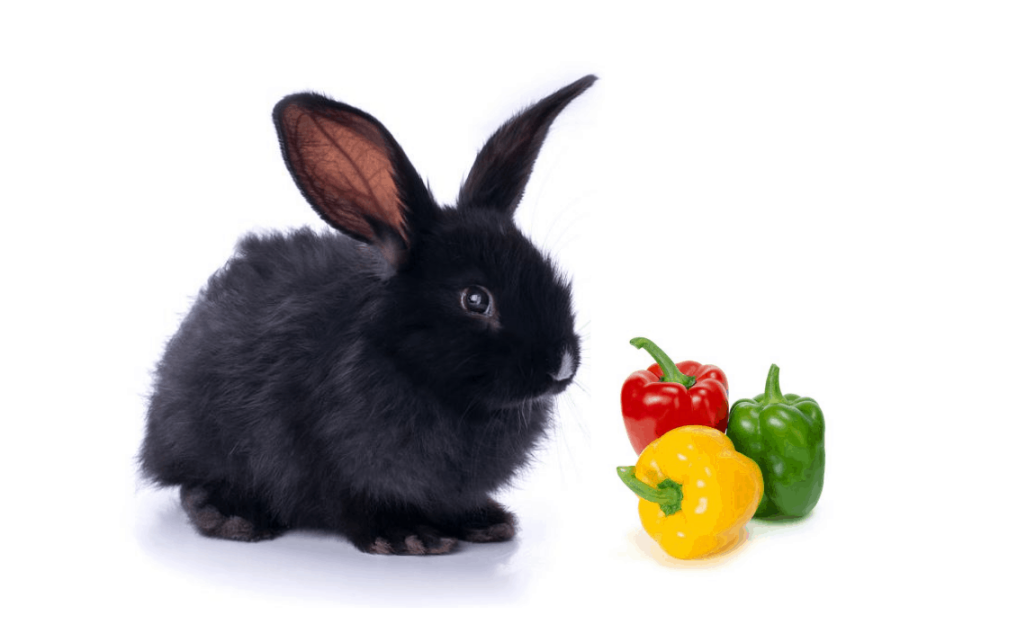How Much Bell Pepper Can a Rabbit Eat?
Bell peppers make a nutritious addition to a rabbit’s diet, providing essential vitamins and minerals. However, it’s crucial to feed them in moderation to prevent any digestive issues. In this article, we will explore how much bell pepper is suitable for rabbits and answer some frequently asked questions about their consumption.

Can Rabbits Eat Bell Pepper?
Yes, rabbits can eat bell peppers. Bell peppers are a safe and healthy treat for rabbits due to their high nutritional value. They are an excellent source of vitamins A and C, fiber, and antioxidants. However, the key is to feed bell peppers in moderation to avoid any adverse effects on your furry friend’s digestive system.
Feeding Bell Peppers to Rabbits
If you’re introducing bell peppers to your rabbit’s diet, it’s essential to start slowly. Begin by offering a small piece of bell pepper and observe how your rabbit reacts to it. Some rabbits may have sensitive stomachs, so it’s crucial to monitor their digestive health. Gradually increase the amount over time, but never exceed the recommended serving size.
Recommended Serving Size
The recommended serving size of bell pepper for rabbits is approximately one tablespoon per two pounds of body weight. This amount can vary depending on the rabbit’s size, age, and overall health. It’s always advisable to consult your veterinarian to determine the appropriate serving size for your specific rabbit.
Benefits of Bell Pepper for Rabbits
Bell peppers offer several benefits to rabbits when fed in moderation. Here are some reasons why they can be a healthy addition to their diet:
- Rich in vitamins: Bell peppers are packed with vitamins A and C, which contribute to a rabbit’s overall well-being.
- High in fiber: Fiber is essential for maintaining a healthy digestive system in rabbits, and bell peppers provide a good amount of dietary fiber.
- Antioxidant properties: The antioxidants found in bell peppers can help boost a rabbit’s immune system and prevent cell damage.
- Hydration: Bell peppers have high water content, which can contribute to a rabbit’s overall hydration.
Potential Risks and Precautions
While bell peppers are generally safe for rabbits, it’s crucial to be aware of potential risks and take necessary precautions:
- Overfeeding: Feeding excessive amounts of bell peppers can lead to digestive issues such as diarrhea. Stick to the recommended serving size to prevent any problems.
- Introduce slowly: If your rabbit hasn’t had bell peppers before, introduce them gradually to avoid any sudden changes in their digestive system.
- Remove seeds and stems: Before offering bell peppers to your rabbit, ensure that all seeds and stems are removed, as they can be a choking hazard.
- Quality and freshness: Always provide fresh bell peppers to your rabbit and avoid those that are wilted or moldy.
Frequently Asked Questions
1. Can rabbits eat all types of bell peppers?
Yes, rabbits can eat all colors of bell peppers, including green, red, yellow, and orange. However, some rabbits may have preferences for certain colors.
2. How often can I feed bell peppers to my rabbit?
Bell peppers should be given as a treat in moderation. It’s recommended to offer them a few times per week, alongside a balanced diet of hay, fresh veggies, and pellets.
3. Can bell peppers cause allergies in rabbits?
While allergies to bell peppers are rare in rabbits, it’s essential to monitor your rabbit’s reaction when introducing them for the first time. If you notice any signs of discomfort or allergic reactions, consult your veterinarian.
4. Are there any alternatives to bell peppers for rabbits?
Yes, there are several other vegetables that rabbits can enjoy, such as carrots, broccoli, spinach, and kale. It’s essential to provide a varied diet to ensure they receive all the necessary nutrients.
In conclusion, bell peppers can be a healthy addition to a rabbit’s diet when fed in moderation. They offer numerous benefits due to their high vitamin content and fiber. Remember to introduce them slowly, stick to the recommended serving size, and keep an eye on your rabbit’s digestive health. As always, consult your veterinarian for personalized advice regarding your rabbit’s diet.
Related Articles…
Copyright Notice:
This website utilizes images found online, all copyrights are retained by their original owners. If you would like an image removed, kindly contact us.